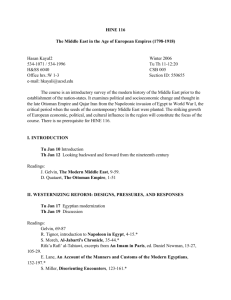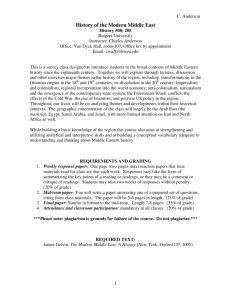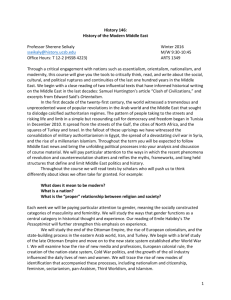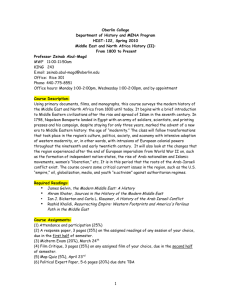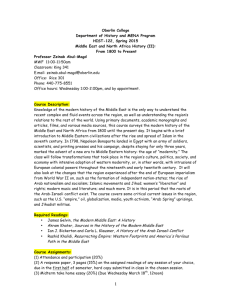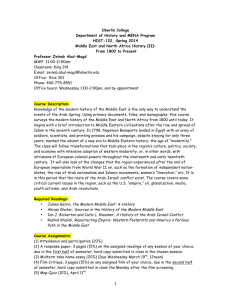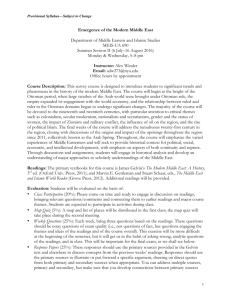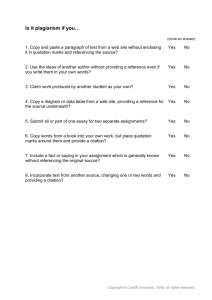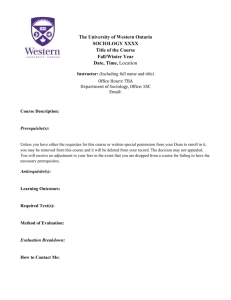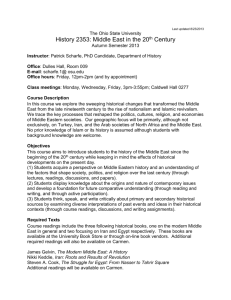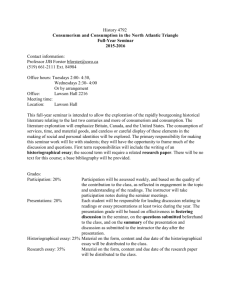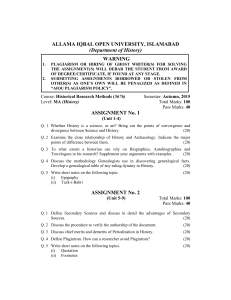History 2162B - A Basic Introduction to the Middle East
advertisement
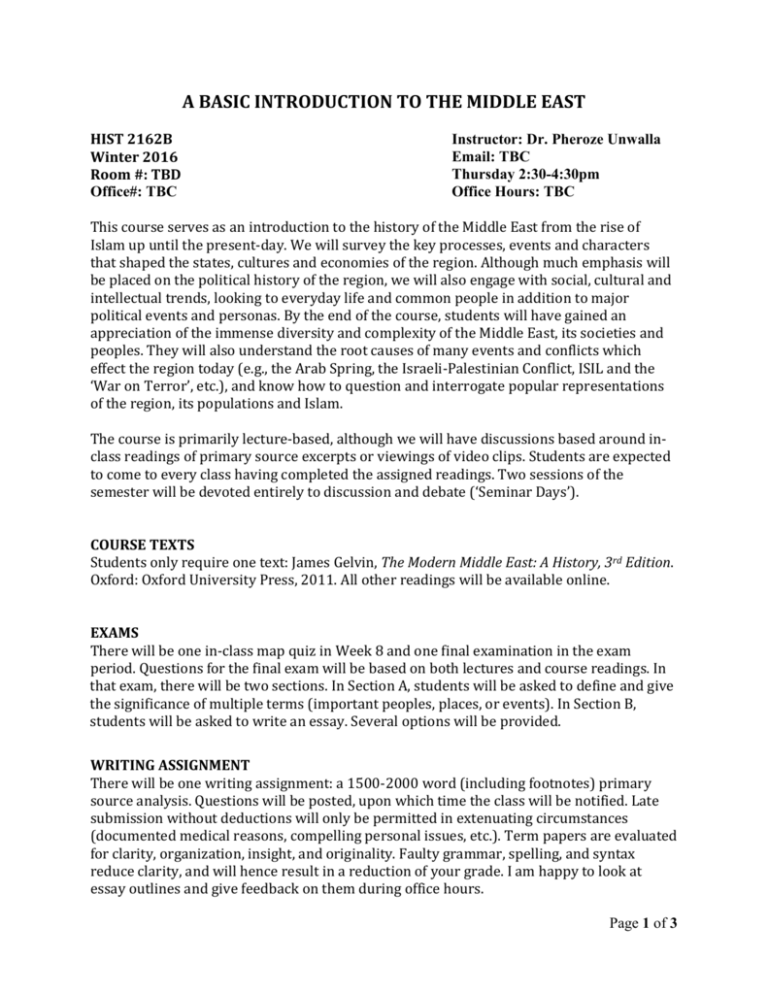
A BASIC INTRODUCTION TO THE MIDDLE EAST HIST 2162B Winter 2016 Room #: TBD Office#: TBC Instructor: Dr. Pheroze Unwalla Email: TBC Thursday 2:30-4:30pm Office Hours: TBC This course serves as an introduction to the history of the Middle East from the rise of Islam up until the present-day. We will survey the key processes, events and characters that shaped the states, cultures and economies of the region. Although much emphasis will be placed on the political history of the region, we will also engage with social, cultural and intellectual trends, looking to everyday life and common people in addition to major political events and personas. By the end of the course, students will have gained an appreciation of the immense diversity and complexity of the Middle East, its societies and peoples. They will also understand the root causes of many events and conflicts which effect the region today (e.g., the Arab Spring, the Israeli-Palestinian Conflict, ISIL and the ‘War on Terror’, etc.), and know how to question and interrogate popular representations of the region, its populations and Islam. The course is primarily lecture-based, although we will have discussions based around inclass readings of primary source excerpts or viewings of video clips. Students are expected to come to every class having completed the assigned readings. Two sessions of the semester will be devoted entirely to discussion and debate (‘Seminar Days’). COURSE TEXTS Students only require one text: James Gelvin, The Modern Middle East: A History, 3rd Edition. Oxford: Oxford University Press, 2011. All other readings will be available online. EXAMS There will be one in-class map quiz in Week 8 and one final examination in the exam period. Questions for the final exam will be based on both lectures and course readings. In that exam, there will be two sections. In Section A, students will be asked to define and give the significance of multiple terms (important peoples, places, or events). In Section B, students will be asked to write an essay. Several options will be provided. WRITING ASSIGNMENT There will be one writing assignment: a 1500-2000 word (including footnotes) primary source analysis. Questions will be posted, upon which time the class will be notified. Late submission without deductions will only be permitted in extenuating circumstances (documented medical reasons, compelling personal issues, etc.). Term papers are evaluated for clarity, organization, insight, and originality. Faulty grammar, spelling, and syntax reduce clarity, and will hence result in a reduction of your grade. I am happy to look at essay outlines and give feedback on them during office hours. Page 1 of 3 COURSE EVALUATION 15% Attendance and Participation 15% In-Class Map Quiz (Week 8) 30% Writing Assignment 40% Final Exam (during exam period) SCHEDULE Week 1 Introduction / What is the Middle East? No readings required Week 2 The Rise of Islam and the Arab Conquests Gelvin, 13-19 P. Crone, “What do we actually know about Muhammad?,” https://www.opendemocracy.net/faith-europe_islam/mohammed_3866.jsp Week 3 The World of the Caliphates Hugh Kennedy, “The Caliphate,” in A Companion to the History of the Middle East. https://wiki.zirve.edu.tr/sandbox/groups/economicsandadministrativesciences/wiki/10b be/attachments/a7a70/The%20CaliphateKennedy.pdf?sessionID=9b922c5065c4e0ec871b43045a8e56b3c5c3609c Week 4 Conflict and Coexistence: Mongols, Crusaders and Arabs Gelvin, 13-24 Reuven Amitai‐Preiss “Mamluk perceptions of the Mongol‐Frankish rapprochement,” Mediterranean Historical Review Volume 7, Issue 1, 1992, 50-65. Week 5 The Ottoman and Safavid empires Gelvin, Chapters 2 + 3 Week 6 SEMINAR DAY: European Imperialism and the Question of Ottoman ‘Decline’ Gelvin, Chapter 5 + 6 Quataert, D. (2003), Ottoman History Writing and Changing Attitudes Towards the Notion of “Decline,” History Compass, 1:1. Page 2 of 3 Virginia Aksan, “Breaking the Spell of the Baron de Tott: Reframing the Question of Military Reform in the Ottoman Empire, 1760–1830,” International History Review. Volume 24, Issue 2, 2002: 253-277. Week 7 ‘A Peace to End All Peace’: The First World War in the Middle East Gelvin, Chapter 11 Week 8 From Empire to Republic: Turkey after the War Gelvin, Chapter 12 Week 9 Nationalism and Islamism in the ‘Arab World’ Gelvin, Chapter 13 +15 Week 10 SEMINAR DAY: Iran and the ‘Islamic’ Revolution Gelvin, Chapter 19 Read all “Articles” 1, 2, 3 and 8 at: http://www.merip.org/mer/mer250 Week 11 Israel and Palestine: From the British Mandate Onwards Gelvin, Chapter 14 + 18 Week 12 Oil, Petro-dollars and the Gulf States Gelvin, Chapter 16 Week 13 Conclusion: The Middle East Today Gelvin, Chapter 17 + Conclusion “The Arab spring. Has it failed?” The Economist. 13 June 2013. http://www.economist.com/news/leaders/21581734-despite-chaos-blood-anddemocratic-setbacks-long-process-do-not-give-up Page 3 of 3 ADDITIONAL STATEMENTS Prerequisites and Antirequisites: Unless you have either the requisites for this course, as described in the Academic Calendar description of the course, or written special permission from your Dean to enroll in it, you may be removed from this course and it will be deleted from your record. This decision may not be appealed. You will receive no adjustment to your fees in the event that you are dropped from a course for failing to have the necessary prerequisites. The Academic Calendar description of each course also indicates which classes are considered antirequisites, i.e., to cover such similar material that students are not permitted to receive academic credit for both courses. Academic Offences: Scholastic Offences are taken seriously and students are directed to read the appropriate policy, specifically, the definition of what constitute a Scholastic Offence, at the following Web site: http://www.uwo.ca/univsec/pdf/academic_policies/appeals/scholastic_discipline_undergrad.pdf Plagiarism: Students must write their essays and assignments in their own words. Whenever students take an idea, or a passage from another author, they must acknowledge their debt both by using quotation marks where appropriate and by proper referencing such as footnotes or citations. Plagiarism is a major academic offense (see Scholastic Offence Policy in the Western Academic Calendar). All required papers may be subject to submission for textual similarity review to the commercial plagiarism detection software under license to the University for the detection of plagiarism. All papers submitted will be included as source documents in the reference database for the purpose of detecting plagiarism of papers subsequently submitted to the system. Use of the service is subject to the licensing agreement, currently between The University of Western Ontario and Turnitin.com (http://www.turnitin.com). The following rules pertain to the acknowledgements necessary in academic papers. A. In using another writer's words, you must both place the words in quotation marks and acknowledge that the words are those of another writer. You are plagiarizing if you use a sequence of words, a sentence or a paragraph taken from other writers without acknowledging them to be theirs. Acknowledgement is indicated either by (1) mentioning the author and work from which the words are borrowed in the text of your paper; or by (2) placing a footnote number at the end of the quotation in your text, and including a correspondingly numbered footnote at the bottom of the page (or in a separate reference section at the end of your essay). This footnote should indicate author, title of the work, place and date of Publication and page number. Method (2) given above is usually preferable for academic essays because it provides the reader with more information about your sources and leaves your text uncluttered with parenthetical and tangential references. In either case words taken from another author must be enclosed in quotation marks or set off from your text by single spacing and indentation in such a way that they cannot be mistaken for your own words. Note that you cannot avoid indicating quotation simply by changing a word or phrase in a sentence or paragraph which is not your own. B. In adopting other writer's ideas, you must acknowledge that they are theirs. You are plagiarizing if you adopt, summarize, or paraphrase other writers' trains of argument, ideas or sequences of ideas without acknowledging their authorship according to the method of acknowledgement given in 'At above. Since the words are your own, they need not be enclosed in quotation marks. Be certain, however, that the words you use are entirely your own; where you must use words or phrases from your source; these should be enclosed in quotation marks, as in 'A' above. Clearly, it is possible for you to formulate arguments or ideas independently of another writer who has expounded the same ideas, and whom you have not read. Where you got your ideas is the important consideration here. Do not be afraid to present an argument or idea without acknowledgement to another writer, if you have arrived at it entirely independently. Acknowledge it if you have derived it from a source outside your own thinking on the subject. In short, use of acknowledgements and, when necessary, quotation marks is necessary to distinguish clearly between what is yours and what is not. Since the rules have been explained to you, if you fail to make this distinction, your instructor very likely will do so for you, and they will be forced to regard your omission as intentional literary theft. Plagiarism is a serious offence which may result in a student's receiving an 'F' in a course or, in extreme cases, in their suspension from the University. Medical Issues: The University recognizes that a student’s ability to meet his/her academic responsibilities may, on occasion, be impaired by medical illness. Please go to https://studentservices.uwo.ca/secure/medical_accommodations_link_for_OOR.pdf to read about the University’s policy on medical accommodation. This site provides links the necessary forms. In the event of illness, you should contact Academic Counselling as soon as possible. The Academic Counsellors will determine, in consultation with the student, whether or not accommodation should be requested. They will subsequently contact the instructors in the relevant courses about the accommodation. Once the instructor has made a decision about whether to grant an accommodation, the student should contact his/her instructors to determine a new due date for tests, assignments, and exams. SUPPORT SERVICES: Students who are in emotional/mental distress should refer to Mental Health@Western, http://www.uwo.ca/uwocom/mentalhealth/ for a complete list of options about how to obtain help. Please contact the course instructor if you require material in an alternate format or if you require any other arrangements to make this course more accessible to you. You may also wish to contact Services for Students with Disabilities (SSD) at 661-2111 x 82147 for any specific question regarding an accommodation. If you have any further questions or concerns please contact, Morgan Sheriff, Undergraduate Program Advisor, Department of History, 519-661-2111 x84999 or msherif5@uwo.ca
